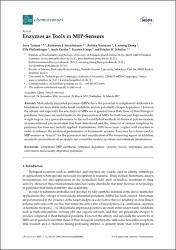Enzymes as tools in MIP-Sensors

Göster/
Erişim
info:eu-repo/semantics/openAccessTarih
2017Yazar
Yarman, AysuJetzschmann, Katharina J.
Neumann, Bettina
Zhang, Xiaorong
Wollenberger, Ulla
Cordin, Aude
Scheller, Frieder W.
Üst veri
Tüm öğe kaydını gösterÖzet
Molecularly imprinted polymers (MIPs) have the potential to complement antibodies in bioanalysis, are more stable under harsh conditions, and are potentially cheaper to produce. However, the affinity and especially the selectivity of MIPs are in general lower than those of their biological pendants. Enzymes are useful tools for the preparation of MIPs for both low and high-molecular weight targets: As a green alternative to the well-established methods of chemical polymerization, enzyme-initiated polymerization has been introduced and the removal of protein templates by proteases has been successfully applied. Furthermore, MIPs have been coupled with enzymes in order to enhance the analytical performance of biomimetic sensors: Enzymes have been used in MIP-sensors as tracers for the generation and amplification of the measuring signal. In addition, enzymatic pretreatment of an analyte can extend the analyte spectrum and eliminate interferences.
















